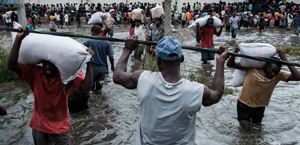
U.S government avails more than N$812 million to those affected by Cyclone Idai

The U.S. Embassy noted President Hage Geingob’s Appeal for Humanitarian Assistance in response to Tropical Cyclone Idai, and welcomed the initiative.
According to the U.S. Embassy in Windhoek, to date, the U.S. government, through the U.S. Agency for International Development (USAID) and the Department of Defense has provided more than US$58 million (N$812 million) to help meet the immediate needs of people affected by this disaster.
As of 9 April Cyclone Idai had resulted in at least 602 deaths in Mozambique and 344 in Zimbabwe with an estimated 1.85 million people in need of assistance in Mozambique alone.
In addition, the number of homes damaged or destroyed by the cyclone has increased to more than 239,700 with an estimated 1.85 million people in need of assistance.
On 20 March, USAID deployed a Disaster Assistance Response Team (DART) to Mozambique to assess damage, identify priority needs, and work closely with partners to provide critical assistance to people in Mozambique. This elite team from USAID’s Office of U.S. Foreign Disaster Assistance is comprised of logisticians, and food security, shelter, health, and water, sanitation, and hygiene experts.
During a telephonic press briefing, USAID Cyclone Idai DART Team Leader, Angela Sherbenou, said, “The U.S. military’s help ensures that relief supplies get on the ground, and this enables our humanitarian partners to move assistance to hard-to-reach areas where people need aid.”
According to Sherbenou, tTo date, at the DART’s request, the U.S. military has flown 60 missions and transported more than 663 metric tons of relief supplies.
“These supplies are food assistance, shelter materials, medical supplies, as well as transporting our DART experts and aid workers to the impacted areas to conduct ongoing assessments,” he added.












































